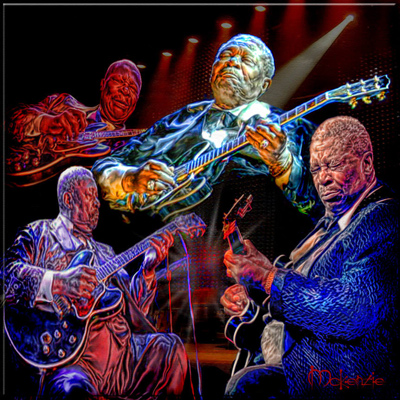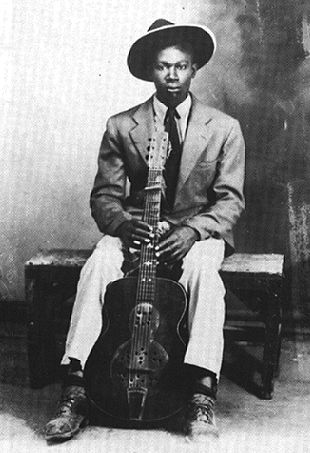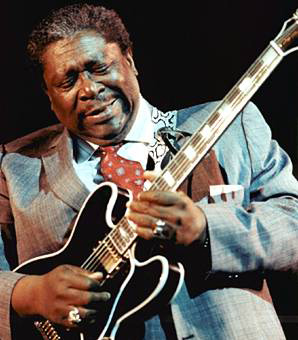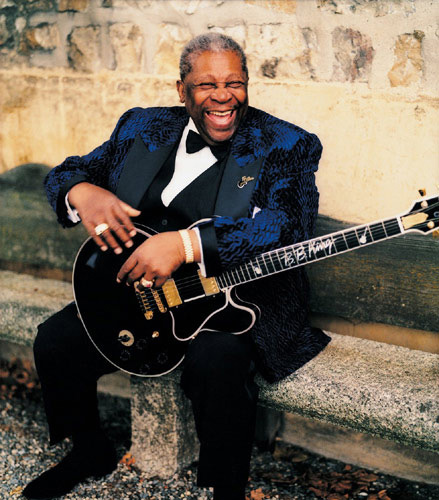In 1949, King began recording songs under
contract with Los Angeles-based RPM Records. Many of King's
early recordings were produced by Sam Phillips, who later
founded Sun Records. Before his RPM contract, King had debuted
on Bullet Records by issuing the single "Miss Martha King"
(1949), which received a bad review in Billboard magazine
and did not chart well.
"My very first recordings [in 1949] were for a
company out of Nashville called Bullet, the Bullet Record
Transcription company," King recalls. "I had horns that very
first session. I had Phineas Newborn on piano; his father played
drums, and his brother, Calvin, played guitar with me. I had
Tuff Green on bass, Ben Branch on tenor sax, his brother, Thomas
Branch, on trumpet, and a lady trombone player."
King assembled his own band; the B.B. King
Review, under the leadership of Millard Lee. The band initially
consisted of Calvin Owens and Kenneth Sands (trumpet), Lawrence
Burdin (alto saxophone), George Coleman (tenor saxophone), Floyd
Newman (baritone saxophone), Millard Lee (piano), George Joyner
(bass) and Earl Forest and Ted Curry (drums). Onzie Horne was a
trained musician elicited as an arranger to assist King with his
compositions. By his own admission, he cannot play chords well
and always relies on improvisation. This was followed by tours
across the USA with performances in major theaters in cities
such as Washington, D.C., Chicago, Los Angeles, Detroit and St.
Louis, as well as numerous gigs in small clubs and juke joints
of the southern US states. King meanwhile toured the entire "Chitlin'
circuit" and 1956 became a record-breaking year, with 342
concerts booked. The same year he founded his own record label,
Blues Boys Kingdom, with headquarters at Beale Street in
Memphis. There, among other projects, he produced artists such
as Millard Lee and Levi Seabury. The record company eventually
failed, however, because King's schedule left him too little
time for the role of a businessman.
In the 1950s, B.B. King became one of the most
important names in R&B music, amassing an impressive list of
hits including "You Know I Love You," "Woke Up This Morning,"
"Please Love Me," "When My Heart Beats like a Hammer," "Whole
Lotta Love," "You Upset Me Baby," "Every Day I Have the Blues,"
"Sneakin' Around," "Ten Long Years," "Bad Luck," "Sweet Little
Angel," "On My Word of Honor," and "Please Accept My Love." In
1962, King signed to ABC-Paramount Records, which was later
absorbed into MCA Records, and then his current label, Geffen
Records. In November 1964, King recorded the Live at the
Regal album at the Regal Theater in Chicago, Illinois.
King won a Grammy Award for a tune called "The
Thrill Is Gone"; his version became a hit on both the pop and
R&B charts, which was rare during that time for an R&B artist.
It also gained the number 183 spot in Rolling Stone
magazine's 500 Greatest Songs of All Time. He gained
further visibility among rock audiences as an opening act on The
Rolling Stones' 1969 American Tour. King's mainstream success
continued throughout the 1970s with songs like "To Know You is
to Love You" and "I Like to Live the Love".
King was inducted into the Blues Hall of Fame in
1980. In 2004 he was awarded the international Polar Music
Prize, given to artists "in recognition of exceptional
achievements in the creation and advancement of music."
From the 1980s onward, King has been recording
less, but he has continued to maintain a highly visible and
active career, appearing on numerous television shows and
performing 300 nights a year. In 1988, King reached a new
generation of fans with the single "When Love Comes to Town", a
collaborative effort between King and the Irish band U2 on their
Rattle and Hum album. In 2000, King teamed up with
guitarist Eric Clapton to record Riding With the King. In
1998, King appeared in The Blues Brothers 2000, playing
the part of the lead singer of the Louisiana Gator Boys, along
with Clapton, Dr. John, Koko Taylor and Bo Diddley.



